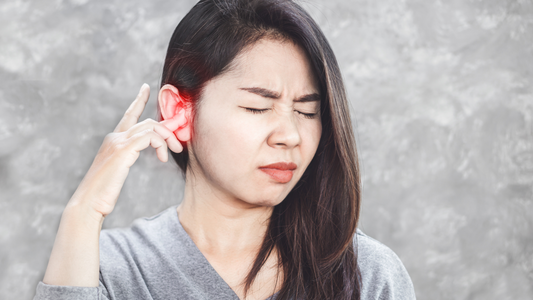Ever noticed a nagging buzz or hum in your ears that won't quit? It's not the neighbor's lawnmower this time; it could be tinnitus. Whether you've dealt with it for a while or it's new to your ears, you're not alone.
Those little quirks of our bodies become more chatty as we rack up years. That high-pitched whistle that seems like a silent shout from your hearing? Let's talk about that. And let's do it without the confusing jargon because let's face it, no one has time for that when it's hard enough just trying to hear the TV.
We've seen folks like Jerry, who could shrug off the faint radio static at 55 but found himself wrestling with a downright noisy beep a decade later. So, pull up a chair. We're peeling back the layers of tinnitus and what it has to do with those candles on your birthday cake, and we're doing it in plain English, with a side of stories, just like we’re sharing a coffee.
Why Does Aging Cause Tinnitus?
Think your ringing ears are just about aging? Well, here's the lowdown: as we hit those golden years, the chances of experiencing a constant hum or whistle in the ears tend to shoot up. But why? It's often a tag-along with hearing loss - something that creeps in with every candle added to the birthday cake. The inner workings of our ears have these tiny hair cells that send sound signals to the brain. Years of cranking the volume up to eleven or even just the wear-and-tear of daily life can bend or break these cells. Then they start to misfire, and voilà - you've got yourself a soundtrack that's not on your playlist.
It's not just about those hair cells, either. The aging process can dial down the effectiveness of the auditory pathways from your ear to the brain, meaning those pathways don't transmit sounds as well as they used to. Imagine your ear is a radio and it's starting to have lousy reception, creating that annoying static – that's the kind of thing we're talking about. And when your brain gets less input from the outside world, it might get all creative and start producing its own noise - hence, tinnitus.
Remember, though, your grandparent's old timer ticking louder in the quiet house? Similar deal with tinnitus. In a quieter hearing environment caused by age-related hearing loss, tinnitus sounds might become more noticeable, simply because they've got less competition. It's not all doom and gloom, though. Being savvy about protecting your ears now could lend you some peace and quiet later.
Does Tinnitus Get Worse The Older You Get?
Wondering if that pesky ringing in your ears is bound to crank up the volume as birthdays pile up? Let's cut to the chase: for some folks, tinnitus can indeed get more persistent or louder with age. That said, it's not a straight line - everyone's ears play by their own rules. Just like your friend who claims they can still hear a pin drop at 70, while you're turning up the TV volume more often.
Take Jerry, for example. At 55, his mild tinnitus was like a faint radio buzz in the background. But by 65, that buzz had turned into more of a constant beeping, compelling him to seek out hearing aids. Moral of the story? Aging can ramp up tinnitus, but not automatically and not for everyone. It's about how well you've treated your ears over the years, too.
- Genetics may play a role – just because your dad's ears rang like church bells doesn't mean yours will.
- Health conditions, like high blood pressure or diabetes, are party crashers that can turn up the tinnitus dial as you age.
- Lifestyle choices – those rock concerts in your 20s might come back to haunt your ears later.
So, will your tinnitus take a bow or stick around for an encore as you get older? It's a bit of a lottery, but how you play the numbers—protecting your hearing, managing stress, avoiding loud noise—can tilt the odds in your favor.
What Should I Do If I Think I Have Tinnitus?
Got that high-pitched whistle or a low hum in your ears driving you batty? If tinnitus has crept into your life, it's high time to play detective and tackle it head-on. First up: track down a trusty Ear, Nose, and Throat (ENT) specialist. These pros are your go-to for sniffing out what's behind the persistent noise and giving it a name.
Next stop: a one-on-one with an audiologist for a thorough hearing check-up. They've got the tools to measure just what kind of escapades your ears have been up to. The results can shed light on your particular tinnitus tune and guide you toward a plan that best suits your needs.
When Silence Isn't Golden:

Tinnitus might not just be a nuisance – it can shake up your whole groove, from tossing and turning all night to making heads or tails of a conversation in a noisy room. The good news? You're in good company, and help is at the ready.
The Next Beats:
Don't fly solo with the constant concert in your head. There's a symphony of strategies out there to help you tune out the annoyance: think hearing aids, sound therapy, or even lifestyle changes to keep the din down. While you're at it, nix loud noises and make friends with silence – your ears will thank you.
The Bottom Line on Tinnitus and Aging
In the end, grappling with tinnitus is a common part of the aging soundtrack for many. But it's not a definite fate for everyone as the candles on the cake multiply. Sure, age-related hearing loss often invites tinnitus to the party, and for some, that unwelcome ringing might grow louder with time. Yet, it's not a universal rule—many variables dance in the mix, from genetics to life choices.
Empowerment Through Action:
Feel like tinnitus is elbowing its way into your life? Taking the reins early with medical advice, supportive treatments, and protective measures can turn down the volume on this condition. It's about playing the long game; proactive steps today can ease those phantom sounds tomorrow.
Turning Knowledge Into Power:
Remember, knowing is half the battle. Keep abreast of the latest findings and equip yourself with ear-friendly habits. There's strength in community and shared knowledge, so consider support groups or forums for additional camaraderie and tips.
No need to accept tinnitus as an inevitable guest with age—there's plenty you can do to keep those uninvited tones at bay. So, take heart: while the years may advance, your control over your hearing health doesn't have to retreat.
The Bottom Line on Tinnitus and Aging
So, you've noticed that buzz or hum in your ears and it feels like it's sticking around for the long haul, huh? We've chewed over what tinnitus can mean as you stack up those years and yes, it often gets chummy with age-related hearing loss. But it's not just about blowing out more birthday candles. Your ears are telling a story that's part history, part genetics, and a whole lot of lifestyle choices.
If you're in the tinnitus club, you've got company. It might be a nagging part of getting older for some, yet how loud it gets or whether it shows up at all isn't set in stone. The way you treated your ears in your heyday, your health, and how quietly you live now all stir the pot. If tinnitus is getting in the way of your day-to-day, hearing aids like those from HearWell Group might help you tune back into life's soundtrack. Remember, you're at the helm of your hearing health—taking control today means a clearer tomorrow.
Sources & References
- Biswas, R., Lugo, A., Gallus, S., Akeroyd, M. A., & Hall, D. A. (2021). Tinnitus prevalence in Europe: a multi-country cross-sectional population study. The Lancet Regional Health - Europe, 12, 100250. https://www.thelancet.com/journals/lanepe/article/PIIS2666-7762(21)00236-2/fulltext
- Bhatt, J. M., Lin, H. W., & Bhattacharyya, N. (2016). Prevalence, Severity, Exposures, and Treatment Patterns of Tinnitus in the United States. JAMA Otolaryngology–Head & Neck Surgery, 142(10), 959–965. https://jamanetwork.com/journals/jamaotolaryngology/fullarticle/2533660
- Stohler, N. A., Reinau, D., Jick, S. S., Bodmer, D., & Meier, C. R. (2019). A study on the epidemiology of tinnitus in the United Kingdom. Clinical Epidemiology, 11, 855–871. https://www.ncbi.nlm.nih.gov/pmc/articles/PMC6813755/
- Cima, R. F. F., Mazurek, B., Haider, H., Kikidis, D., Lapira, A., Noreña, A., & Hoare, D. J. (2019). A multidisciplinary European guideline for tinnitus: diagnostics, assessment, and treatment. HNO, 67(1), 10–42. https://link.springer.com/article/10.1007/s00106-019-0633-7
- Langguth, B., Kreuzer, P. M., Kleinjung, T., & De Ridder, D. (2013). Tinnitus: causes and clinical management. The Lancet Neurology, 12(9), 920-930. https://www.thelancet.com/journals/laneur/article/PIIS1474-4422(13)70160-1/fulltext
- Piccirillo, J. F., Rodebaugh, T. L., & Lenze, E. J. (2020). Tinnitus. JAMA, 323(15), 1497-1498. https://jamanetwork.com/journals/jama/article-abstract/2763317

The Hear Well Group Research Team: Trusted Hearing Health Insights
Our experienced research team compiles hearing health data from credible, peer-reviewed sources and presents it in easy-to-understand terminology. We ensure accuracy and trustworthiness, providing up-to-date, evidence-based recommendations to enhance hearing care practices and inform our readers' hearing well-being decisions.


